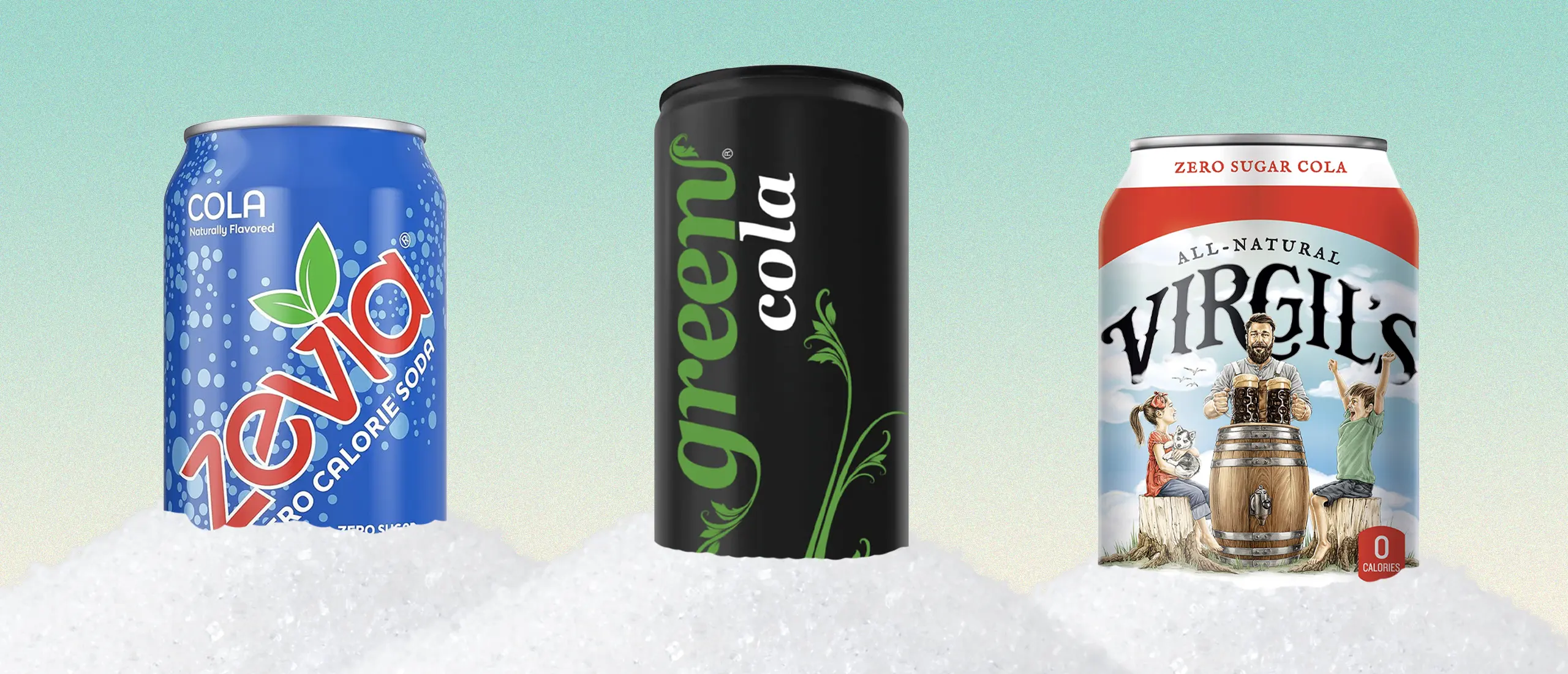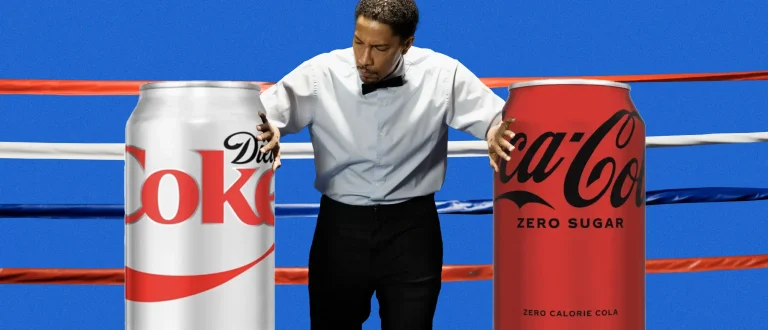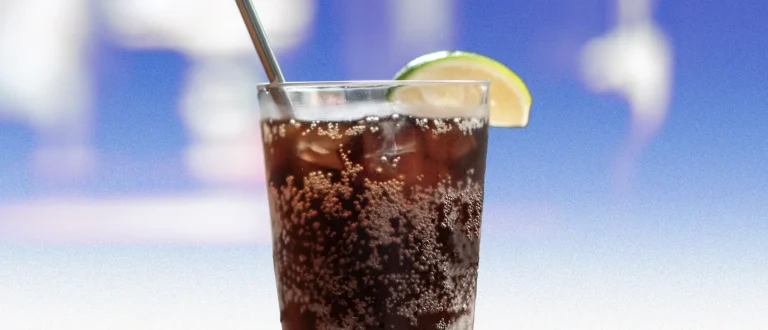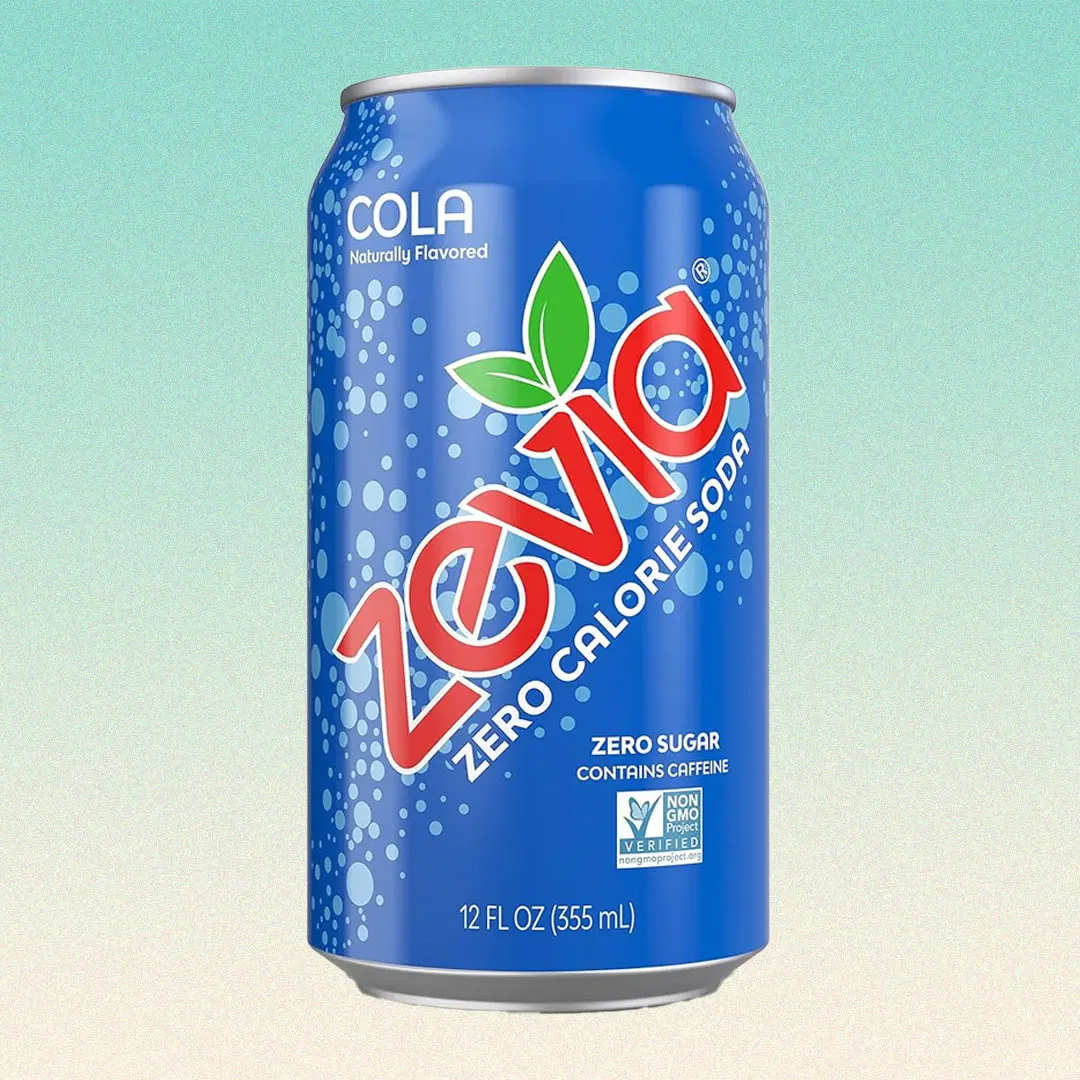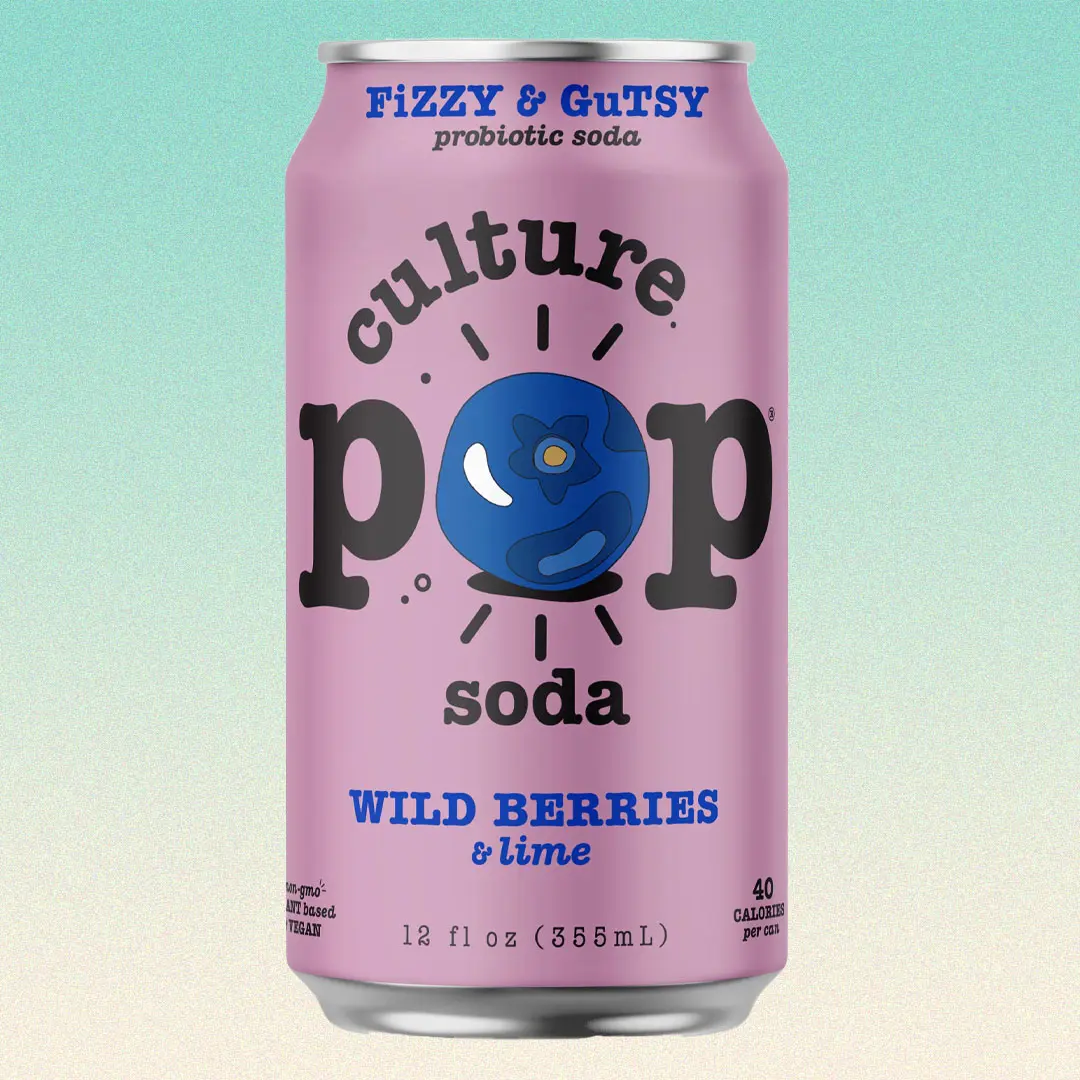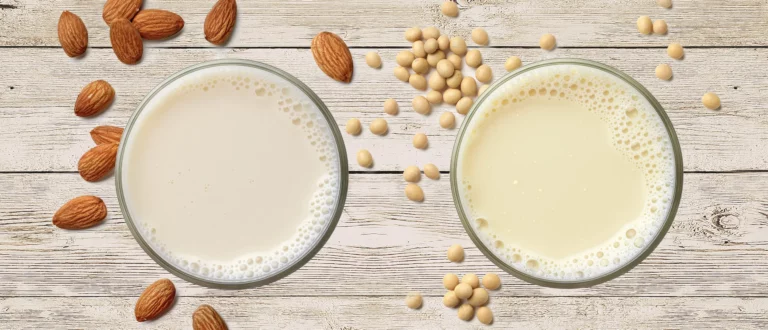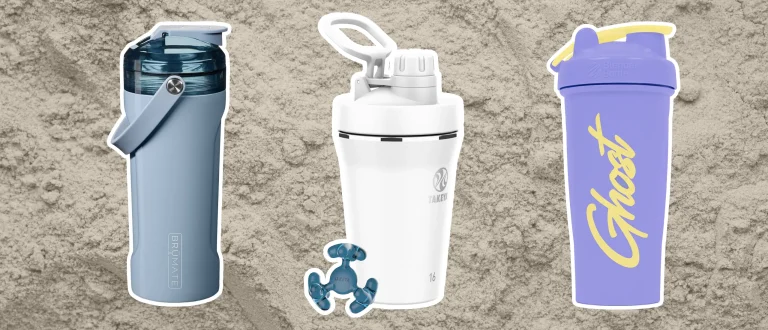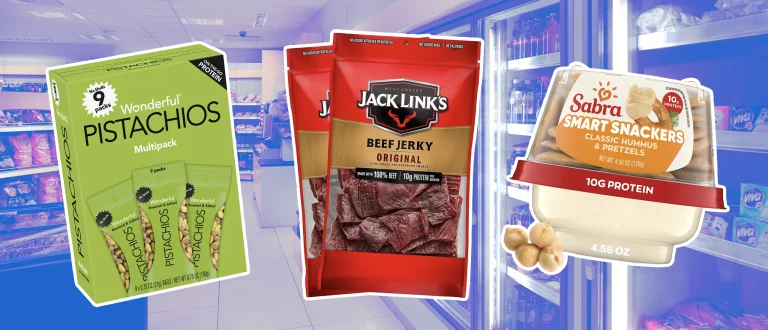30-Second Takeaway
- Many diet sodas contain aspartame, an artificial sweetener that has been cited as a possible carcinogen.
- You can safely consume up to 40 milligrams of aspartame per kilogram of body weight per day before increasing your cancer risk—about 12 cans of diet soda a day for a 150-pound person.
- To minimize your exposure, choose aspartame-free diet sodas or healthier soda alternatives.
Our product recommendations are selected by editors, tested first-hand, or expert-approved. We may earn a commission through links on our site.
If you simply can’t resist the satisfying zing of that first sip of Diet Coke, we get it. Diet soda is just as delicious as the real thing, without the calories—what more could one want from a beverage?
As tasty as diet soda might be, most contain additives you may want to avoid like aspartame—which has been linked to cancer and may negatively impact mood and hormonal health (1, 2). Still, you have to drink about 12 cans of diet soda a day to increase your cancer risk, according to the WHO.
Meaning: Drinking a Diet Coke here or there is probably no biggie, but if you’re guzzling multiple a day it might be worth swapping it out for an aspartame-free alternative. Some people may also be more sensitive to aspartame than others, says Sean Marchese, M.S., R.N., a registered nurse who specializes in oncology.
If you want to crack a can of bubbly while minimizing potential health risks, choosing a diet soda without aspartame might be the move. Here’s what you need to know.
About the Expert
Sean Marchese, M.S., R.N. is a registered nurse at The Mesothelioma Center with a background in oncology clinical trials, a master’s in medical sciences, and over 20 years of patient care experience. Sean also has a background in food microbiology.
What Is Aspartame?
Discovered by accident in 1965, aspartame is 200 times sweeter than sucrose (AKA sugar). You can find it in tons of sugar-free food products like diet soda, gum, Jell-O, and table sweeteners like Equal.
Aspartame does contain calories (4 calories per gram, the same as sugar), but since it’s so sweet the amount of aspartame needed to sweeten something is so small that the calories are negligible. For example, one can of Diet Coke uses 200 milligrams of aspartame (0.8 calories) as a sweetener whereas one can of regular Coke contains 39 grams of sugar (156 calories).
Aspartame drinks tend to have a slightly bitter—though not unpleasant—aftertaste. And compared to regular sugar where the sweetness hits your tastebuds immediately, the sweetness from aspartame may take a bit longer to register.
MORE DIET SODA
Is Aspartame Bad For You?
Every few years aspartame makes headlines for potential side effects like disrupted gut health and inflammation. Most recently, the International Agency for Research on Cancer (IARC) classified aspartame as “possibly carcinogenic to humans” based on limited evidence that it might cause liver cancer when consumed in very high amounts.
The IARC uses four different levels to classify the strength of evidence that something causes cancer. Aspartame has a 2B classification and according to the American Cancer Society, “The Group 2B classification is the third highest out of 4 levels, and it is generally used either when there is limited, but not convincing, evidence for cancer in humans, or when there is convincing evidence for cancer in lab animals, but not both (3).”
Aside from cancer, the research on other health impacts of aspartame is mixed. However, cognitive, metabolic, and hormonal issues have been found in animal studies.
In humans, some research suggests a link between aspartame and preterm birth deliveries and allergies in infants (2). Another study suggests higher intakes of aspartame might increase irritability and depression (4).
When it comes to making definitive statements about the health impacts of aspartame, more research in humans is needed. But per Marchese, it might still be worth avoiding. “While there are potential sources of cancer risk around us every day, if we can take measures to limit one possible area that could cause grief ten or twenty years down the line, I think that’s worth it,” he says.
How Much Aspartame is Safe?
The World Health Organization set the acceptable daily intake of aspartame at 0 to 40 milligrams per kilogram of body weight per day (40 mg/kg/day). This differs from the FDA’s guidelines of 50 milligrams per kilogram of body weight per day (50 mg/kg/day). We’d suggest going with the lower number while keeping in mind that a 70-kilogram person (154 pounds) would have to consume 9 to 14 cans of diet soda to hit this limit.
Still, these numbers are just a ballpark. “You’ll need to determine if the cancer risk is too high for you based on genetic factors, health history, and other potential environmental risks for cancer,” says Marchese.
Your individual metabolism may also impact your response to aspartame. “While one to two cans of Diet Coke might metabolize quickly in one person, it could prove to be a much more significant risk in someone struggling to break down glucose and other sugars,” says Marchese. Aspartame may also contribute to insulin intolerance and other issues over time, further complicating what constitutes a safe threshold for diet soda consumption, he adds.
If you’re concerned about hitting your safe limit of aspartame, consult your healthcare provider. “You can only know whether your body is processing aspartame efficiently by receiving regular blood testing for sugar metabolism and insulin levels,” says Marchese.
Diet Sodas With Aspartame
Diet sodas that contain aspartame include:
- Diet Coke
- Caffeine Free Diet Coke
- Seagrams’s Zero Sugar Ginger Ale
- Fanta Zero Sugar
- Barq’s Zero Sugar Rootbeer
- Diet Pepsi
- Pepsi Zero Sugar
- Diet Pepsi Wild Cherry
- Diet Pepsi Caffeine Free
- Sprite Zero Sugar
- Diet Mountain Dew
- Zero Sugar Mug
- 7-Up Zero Sugar
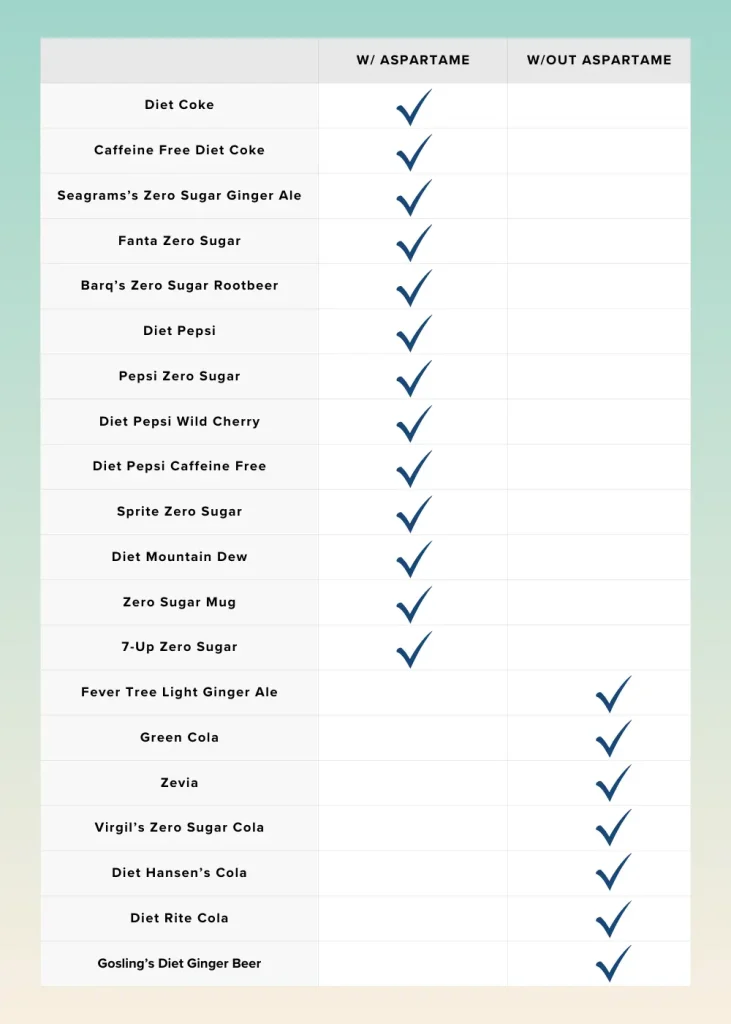
Diet Sodas Without Aspartame
Aspartame-free diet sodas are hard to find, but here are a few of the most popular options:
- Fever Tree Light Ginger Ale
- Green Cola
- Zevia
- Virgil’s Zero Sugar Cola
- Diet Hansen’s Cola
- Diet Rite Cola
- Gosling’s Diet Ginger Beer
Just because a diet soda is aspartame-free, doesn’t mean it’s healthy. Most of the sodas on the above list contain different artificial sweeteners like sucralose and Acesulfame potassium (AKA Ace K) which may have their own unwanted side effects such as gastrointestinal issues, migraines, and chronic inflammation. Sucralose has not been linked to cancer risk, but a large cohort study in 2022 found high consumption of Ace K to be linked to increased cancer risk (65).
There are only two high-quality aspartame-free sodas we’d *actually* recommend if health is the end goal:
Soda Alternatives Without Aspartame
If you aren’t stuck on diet soda, there are plenty of soda alternatives that skip aspartame. These soda alternatives contain significantly less sugar and calories than regular soda and may contain good-for-you ingredients like probiotics, vitamins, and minerals. Here are our top picks:
Culture Pop
Culture Pop defines itself as a “soda you can feel good about.” Free of artificial sweeteners, refined sugars, and natural sugar alternatives, these drinks get their slightly sweet flavor from organic fruit juice. Available in eight flavors, one can is only 45 calories. We also love that billions of live probiotics are added to each can for a gut health boost.
Ruby Sparkling Hibiscus
Fans of black cherry soda may like Ruby’s Sparkling Hibiscus drinks. The original flavor is free of any sugar, or calories. The only ingredients are water and organic brewed hibiscus. Hibiscus is a nutrient-dense plant that offers many health benefits and a tart and refreshing flavor.
Casamara Club Sera
Casamara Club offers a range of what the brand calls “leisure sodas”—drinks with the pop and fizz of a soda, with a unique blend of botanical extracts to add cocktail-level sophistication (without the alcohol). The botanical extracts are minimally processed in small batches for an extra dry finish.
Containing digestive-supporting ingredients like peppermint, licorice root, and grapefruit—the “Sera” flavor is our go-to after-dinner drink. It’s sweetened with honey, and one bottle contains four grams of sugar and only 15 calories.
FAQs
Who should avoid aspartame?
Individuals who have been diagnosed with phenylketonuria (PKU) should avoid aspartame. PKU is a rare genetic disorder that causes the amino acid phenylalanine to build up in the body. Individuals with PKU need to limit the amount of phenylalanine in their diet. Since aspartame is partially made up of phenylalanine, avoiding sodas and foods with this ingredient cuts down on risk.
What is a good replacement for Diet Coke?
Green Cola is a healthier alternative that looks and tastes like Diet Coke and is sweetened with stevia. Zevia is an even cleaner option that’s sweetened with stevia and is free of artificial colors.
What are healthy diet soda alternatives?
Plain water, sparkling water, or unsweetened iced tea are the healthiest zero-calorie, zero-sugar soda alternatives available. If you prefer something with a little pizazz, consider kombucha, prebiotic soda, or probiotic soda. Look for an option with the least amount of sugar, that’s made with familiar ingredients like water, juice, herbs, and spices.
- Aspartame Hazard and Risk Assessment Results Released.
- Aspartame—True or False? Narrative Review of Safety Analysis of General Use in Products.
- Aspartame and Cancer Risk.
- Neurobehavioral Effects of Aspartame Consumption.
- Artificial Sweeteners and Cancer Risk: Results From the NutriNet-Santé Population-Based Cohort Study.

